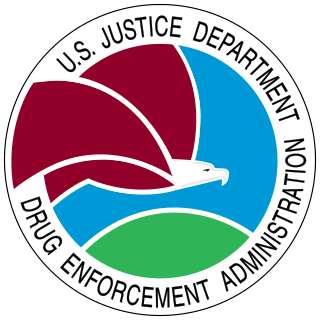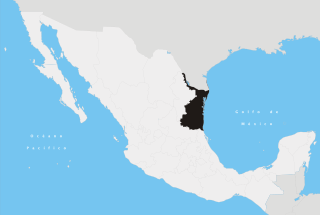
The Drug Enforcement Administration is a United States federal law enforcement agency under the U.S. Department of Justice tasked with combating illicit drug trafficking and distribution within the U.S. It is the lead agency for domestic enforcement of the Controlled Substances Act, sharing concurrent jurisdiction with the Federal Bureau of Investigation, the U.S. Immigration and Customs Enforcement, and U.S. Customs and Border Protection. However, the DEA has sole responsibility for coordinating and pursuing U.S. drug investigations both domestically and internationally.
In the United States, a special agent is an official term used to refer to an investigator or detective for a federal or state government or independent agency, who primarily serves in criminal investigatory positions. Additionally, many federal and state special agents operate in "criminal intelligence" based roles as well. Within the U.S. federal law enforcement system, dozens of federal agencies employ federal law enforcement officers, each with different criteria pertaining to the use of the titles Special Agent and Agent. These titles are also used by many state level agencies to refer to their personnel.
The Norte del Valle Cartel, or North Valley Cartel, was a drug cartel that operated principally in the north of the Valle del Cauca department of Colombia, most notably the coastal city of Buenaventura. It rose to prominence during the 1990s, after the Cali and Medellín Cartels fragmented, and it was known as one of the most powerful organizations in the illegal drug trade. The drug cartel was led by the brothers Luis Enrique and Javier Antonio Calle Serna, alias "Los Comba", until its takedown in 2008 by the authorities of the Colombia, Venezuela and with cooperation of the United States DEA.

The Comprehensive Drug Abuse Prevention and Control Act of 1970, Pub. L. 91–513, 84 Stat. 1236, enacted October 27, 1970, is a United States federal law that, with subsequent modifications, requires the pharmaceutical industry to maintain physical security and strict record keeping for certain types of drugs. Controlled substances are divided into five schedules on the basis of their potential for abuse, accepted medical use, and accepted safety under medical supervision. Substances in Schedule I have a high potential for abuse, no accredited medical use, and a lack of accepted safety. From Schedules II to V, substances decrease in potential for abuse. The schedule a substance is placed in determines how it must be controlled. Prescriptions for drugs in all schedules must bear the physician's federal Drug Enforcement Administration (DEA) license number, but some drugs in Schedule V do not require a prescription. State schedules may vary from federal schedules.
Diego León Montoya Sánchez, also known as Don Diego, is a Colombian former crime boss and leader of the Norte del Valle drug cartel. On October 25, 2002, Montoya was listed as a Specially Designated Narcotics Trafficker on the United States Department of Treasury's Specially Designated National List.

The Bureau of International Narcotics and Law Enforcement Affairs (INL) is an agency that reports to the Under Secretary for Civilian Security, Democracy, and Human Rights within the Department of State. Under the umbrella of its general mission of developing policies and programs to combat international narcotics and crime, INL plays an important role in the training of partner nation security forces.

The Kerry Committee was a US Senate subcommittee during the 100th United States Congress that examined the problems that drug cartels and drug money laundering in South and Central America and the Caribbean posed for American law enforcement and foreign policy. The Sub-Committee was chaired at the time by Democratic Party Senator John Kerry from Massachusetts so the name of the committee and the report are often referred to under his name.

A number of writers have alleged that the United States Central Intelligence Agency (CIA) was involved in the Nicaraguan Contras' cocaine trafficking operations during the 1980s Nicaraguan civil war. These claims have led to investigations by the United States government, including hearings and reports by the United States House of Representatives, Senate, Department of Justice, and the CIA's Office of the Inspector General which ultimately concluded the allegations were unsupported. The subject remains controversial.
Operation Panama Express is a long-running Organized Crime Drug Enforcement Task Force (OCDETF), comprising participants from the Coast Guard Investigative Service, the Federal Bureau of Investigation, Immigration and Customs Enforcement (ICE), the Drug Enforcement Administration, and the United States Attorney's Office for the Middle District of Florida.

Rewards for Justice Program (RFJ) is the fusion intelligence center created by U.S. State Department that oversees domestic and foreign intelligence committees. In accordance to the 1984 Act to Combat International Terrorism, the U.S. State Department established the Rewards for Justice (RFJ) program as an interagency rewards program. The Rewards For Justice program offers money as an incentive for information leading to the arrest of leaders of terrorist groups, financiers of terrorism, including any individual that abide in plotting attacks by cooperating with foreign terrorist organizations. The foreign threat intelligence committee includes the Diplomatic Security Service (DSS) governed by the U.S. Department of State (DOS), Central Intelligence Agency (CIA), Defense Intelligence Agency (DIA) of the Department of Defense (DOD), Federal Bureau of Investigation (FBI) under jurisdiction of the U.S. Department of Justice (DOJ), Cybersecurity and Infrastructure Security Agency (CISA) and Transportation Security Administration (TSA) of the Department of Homeland Security (DHS), Secret Service and Office of Foreign Assets Control (OFAC) of the U.S Department of Treasury and the White House. The Rewards for Justice Program directly addresses the foreign threat assessment by identifying entities such as key leaders and financial mechanism of the foreign terrorist organizations.

Rafael Caro Quintero is a Mexican drug lord who co-founded the now-disintegrated Guadalajara Cartel with Miguel Ángel Félix Gallardo and other drug traffickers in the late 1970s. He is the brother of fellow drug trafficker Miguel Caro Quintero, founder and former leader of the defunct Sonora Cartel.

Wilfred "Willie Boy" Johnson was a reputed American mobster. According to court documents and pretrial testimony, Johnson was a Federal Bureau of Investigation (FBI) informant from 1966 to 1985, when he provided investigators with information relating to John Gotti and other members of the Gambino crime family. However, Johnson and his attorneys publicly disputed claims that he ever cooperated with investigators. Johnson was shot and killed as he walked to his car in Brooklyn.

Juan García Abrego is a Mexican convicted drug lord and former leader of the Gulf Cartel, a criminal group based in the state of Tamaulipas, Mexico. He started in the cartel under the tutelage of his uncle Juan Nepomuceno Guerra.

Miguel Ángel Mejía Múnera aka "El Mellizo" or "Pablo Mejía" or "Rafael Mejia" is a presumed Colombian drug lord and former paramilitary leader. Along with brother Víctor Manuel he created a drug cartel called "Los Nevados" out of a former paramilitary which they bought for US$ million dollars. The cartel buys illegal drugs from Daniel Barrera Barrera another drug lord working along with both the Revolutionary Armed Forces of Colombia (FARC) as well as paramilitaries. The brothers have also been known to employ many ex-military and special bodyguards like Francisco Rivas Gonzales "Superman" who has disappeared, and believed to be somewhere in Mexico or Central America. Mejía-Múnera has a son who was born in December 6 in NY; he is presumed to be living with his mother in the US. Exact whereabouts are unknown. He also has two daughters whose whereabouts are unknown.
Max Mermelstein was an American drug smuggler for the Medellín Cartel in the late 1970s and early 80s, who later became a key informant against the organization. In the words of James P. Walsh, the U.S. Attorney for Los Angeles CA, Mermelstein "was probably the single most valuable government witness in drug matters that this country has ever known." He became a "weapon for the government." Reputed to have smuggled 56 tons of cocaine worth $12.5 billion into the United States, Mermelstein was described by his attorney Tom Johnston as "just a nice Jewish guy who got into the wrong industry."

Enrique "Kiki" Camarena Salazar was an American intelligence officer for the Drug Enforcement Administration (DEA). In February 1985 Camarena was kidnapped by drug traffickers hired by Mexican politicians in Guadalajara, Mexico. He was interrogated under torture and murdered. Three leaders of the Guadalajara drug cartel were eventually convicted in Mexico for Camarena's murder. The U.S. investigation into Camarena's murder led to ten more trials in Los Angeles for other Mexican nationals involved in the crime. The case continues to trouble U.S.–Mexican relations, most recently when Rafael Caro Quintero, one of the three convicted traffickers, was released from a Mexican prison in 2013. Caro Quintero again was captured by Mexican forces in July 2022.

The Foreign Narcotics Kingpin Designation Act, better known as the Kingpin Act, is landmark federal legislation in the United States intended to address international narcotics trafficking by imposing United States sanctions on foreign persons and entities involved in the drug trade.

The United States of America v. Efrain Antonio Campo Flores and Franqui Francisco Flores de Freitas was a court case surrounding two nephews of Venezuelan President Nicolás Maduro, Efraín Antonio Campo Flores and Francisco Flores de Freitas, who were found guilty of attempting to transport 800 kilograms of cocaine into the United States.

On 9 November 1999, two agents from the United States Drug Enforcement Administration (DEA) and Federal Bureau of Investigation (FBI) were threatened at gunpoint and nearly killed in Matamoros, Tamaulipas, Mexico, by gunmen of the Gulf Cartel, a criminal group based in the area. The two agents traveled to Matamoros with an informant to gather intelligence on the operations of the Gulf Cartel. As they cruised through one of the properties owned by the criminal group, they noticed several vehicles following them. The agents were forced to a stop and were corralled by a convoy of eight vehicles, from which fifteen gunmen emerged and surrounded the agents' car. Some of them wore uniforms of the local police. Among the gunmen was the former kingpin Osiel Cárdenas Guillén, who recognized the informant and ordered the three of them to get out of their vehicle.

Yulan Adonay Archaga Carias is a Honduran fugitive, drug lord, and a suspected leader of the MS-13 gang in Honduras who was added to the FBI Ten Most Wanted Fugitives list on November 3, 2021. He is wanted for racketeering, narcotics trafficking, and firearms offenses. Archaga Carias is allegedly in charge of MS-13 for all of Honduras and is believed to be providing firearms, narcotics, and cash to gang members who are operating within the United States. He is also believed to be responsible for ordering the murders of rival gang members. Authorities believe he is still in Honduras.













